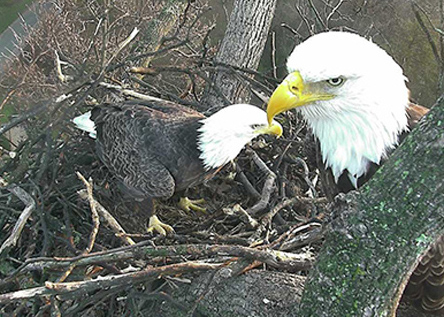|
|
Watch Bald Eagles Nesting Live at the U.S. National Arboretum
By Sharon Durham
February 16, 2016
WASHINGTON, February 16, 2016—The eagles have landed, again, at the Agricultural Research Service’s (ARS) U.S. National Arboretum (USNA) in Washington, DC. Thanks to the Eagle Nest Cams, you have a front row seat.
Available at www.eagles.org/dceaglecam, the cameras allow you to look inside the nest of “Mr. President” and “The First Lady” at any time, day or night. The pair first called the Arboretum home last year when they became the first mated pair of bald eagles to nest at the Arboretum since 1947.
The availability of the Eagle Nest Cams is a cooperative endeavor between the Arboretum and the not-for-profit American Eagle Foundation (AEF) headquartered in Pigeon Forge, Tennessee.
“We’re excited to partner with the AEF to give the world a unique glimpse into the life of our national bird from our national capital,” said ARS Administrator Dr. Chavonda Jacobs-Young. “The bald eagle is an endearing symbol of freedom and the American spirit. The return of the eagles to the Arboretum is a prime example of the impact of ARS’s work – in this instance, in helping with the preservation of a once-endangered species.”
In anticipation of the eagles’ return, Arboretum and AEF staff installed two HD video cameras near last year’s nest. That effort included installing a half mile of fiber optic cable and installing a large solar array powering the equipment that was designed and built by students and staff from Alfred State, SUNY College of Technology.
The eagle pair returned to their nest in October 2015. Since January 2016, they have fortified their nest with twigs and grass in preparation for laying eggs. The installed cameras protect the nesting pair by minimizing disturbances by visitors. People, noise, and other distractions near the nest can cause the eagles to abandon the nest and eggs.
The pair’s first egg was laid on February 10 and the second on Valentine’s Day. Since it typically takes an average of 35 days for the eggs to hatch, the Arboretum might welcome eaglets as early as March.